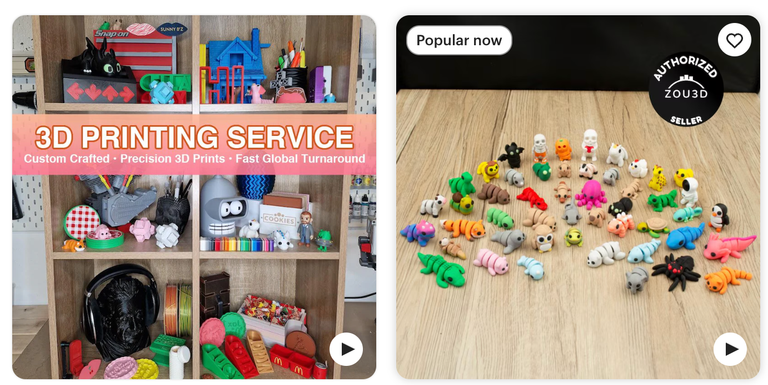
Etsy's recent changes to their policies have caused a significant chilling effect in the 3D printing, laser cutting, and CNC communities.
For small businesses and hobbyists, these updates mean a massive shift in how they can sell digital files and physical products.
If you’re involved in making, even as a hobbyist or small seller, understanding what’s changed is crucial to avoid unexpected disruptions.
Why Are Etsy’s Policy Changes Important?
Etsy has historically been a platform for handmade, vintage, and unique items.
Then the print on demand, drop-shippers, and "arbitrage" folks saw an opportunity and the "hand made", artisan brand promise fell away (buying cheap from Aliexpress/Alibaba, and selling at a markup, for example).
Over time, it became popular for selling digital files and licensed 3D printed products as well. These goods depended on licensing and manufacturing existing designs from creators or using third-party file libraries such as Thingiverse.
Recently, Etsy tightened its rules around the production and sale of items made with computerized tools like 3D printers, laser cutters, CNC machines, or Cricut devices. These changes have led to the shutdown of many small stores and caused loss of income, sometimes amounting to thousands of dollars a year.
Understanding these rules helps avoid accidental violations that can shut down your shop and affect your livelihood.
What Did the Old Rules Say?
Previously, Etsy's policy for items made using digital tools was a bit more flexible. It stated that products created using tools like 3D printers, laser cutters, CNC devices, or Cricut machines could be sold if they were based on:
- the seller’s original design, OR
- a template or pattern that the seller adapted.
This meant that if someone paid for a design or modified an existing template, they could still sell the item. As long as you created or significantly altered the design, you could sell it.
What Are the New Rules?
The updated policy simplifies the language but tightens the restrictions. It now states items produced using digital tools must be based on the seller’s original design.
This means:
- You cannot sell items based on licensed designs created by others unless you have created the design yourself from scratch.
- Templates, patterns, or licensed files from third-party creators are no longer permitted for sale unless you modify or adapt them heavily to create something essentially new on your own.
Why Is This Important?
If you are using files licensed from other creators, you are not "the creator" of those designs. As a result, selling those files or products derived from them will violate Etsy’s new policies.
Many small businesses and hobbyists relied on licensing third-party files or Patreon memberships to produce items for sale on Etsy.
Using paid licenses from creators to produce flexible props or accessories or selling popular franchise or branded items that they did not design themselves.
Once Etsy updated its rules, these sellers found their shops shut down with little to no recourse. The appeals are often met with automated responses, and accounts are suspended quickly.
Practical Steps to Adapt Your Business
Despite the restrictions, there are ways to stay compliant and continue selling:
1. Create Original Designs
- Design your own models using 3D modeling software like OnShape, Blender, Tinkercad, or Fusion 360.
- If you’re not comfortable designing from scratch, consider hiring freelance modelers on platforms like Upwork or Fiverr.
2. Use AI-Assisted Design Tools
- AI tools like ChatGPT can help with brainstorming and planning your designs.
- Use image-based AI tools to generate concepts that can then be refined or modeled by a professional, or even alsmost finished models.
3. Build a Website
- Since policies on platforms like Etsy are subject to change, establish your own online store.
- Direct your social media followers or existing customers to your site.
- This reduces reliance on marketplace policies and gives you more control.
4. Offer Personalization
- Add custom touches to your products, like names or unique features, which can make items more appealing and compliant.
- Personalized, handmade, or printed products are less likely to violate policies.
5. Stay Informed & Prepare for Policy Updates
- Keep a close eye on policy changes across selling platforms.
- Regularly update your business practices to stay compliant.
Legal and Ethical Considerations
- Selling licensed or CLA (commercial license authorized) files is now risky.
- Even with licenses, if the design was not created by you, it may violate Etsy’s new rules.
- Creating or commissioning original designs ensures compliance and builds a more sustainable business.
Bottom Line
Etsy’s policy update returns the brand back toward promoting original, hand-crafted content and discouraging drop-shipping, reselling or licensing.
While this change may seem restrictive, it encourages artists and entrepreneurs to develop their unique creations and talents, and prevent the race to the bottom of people reselling aliexpress junk.
Establishing your own line of models, building a branded website, and focusing on original content can safeguard your business from sudden account closures. This approach might require more effort or investment upfront but will result in a more resilient and compliant operation.